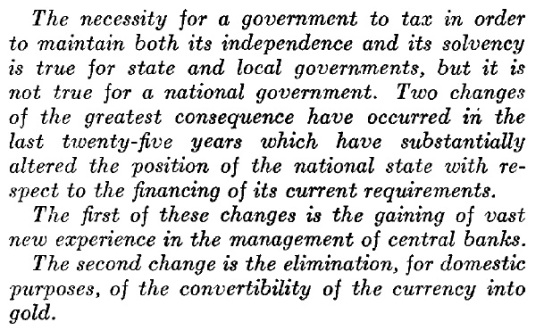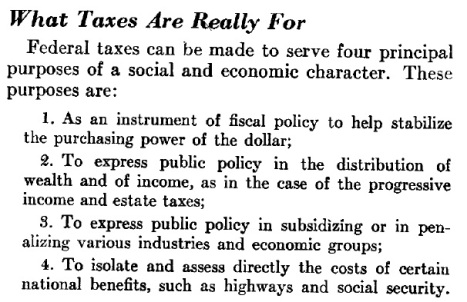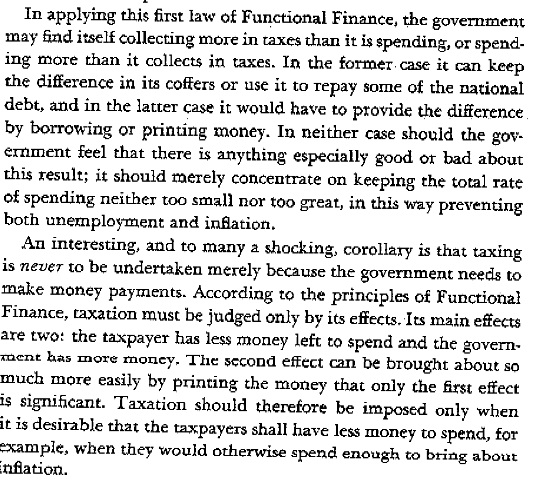The other day my friend Rohan Grey — a lawyer and one of the key organisers behind the excellent Modern Money Network (bringing Post-Keynesian economics to Columbia Law School, yes please!) — directed me to an absolutely fascinating piece of writing. It is called ‘Taxes For Revenue Are Obsolete’ and it was written in 1945 by Beardsley Ruml. Ruml was the director of the New York Federal Reserve Bank from 1937-1947 and also worked on issues of taxation at the Treasury during the war.
The article lays out the case that taxation should not be focused on revenue generation. Rather, Ruml argues, it should be thought of as serving other purposes entirely. He writes:
 Basically Ruml is making the same case that the Modern Monetary Theorists (MMTers) make: a country that issues its own sovereign currency and is unconstrained by a gold standard does not require tax revenue in order to fund spending. This is because the central bank always stands by ready and able to buy any sovereign debt issued that might lead to the interest rate rising. Indeed, it does this automatically in the way that it conducts its interest rate policy. Ruml then outlines what taxation is really for in such a country.
Basically Ruml is making the same case that the Modern Monetary Theorists (MMTers) make: a country that issues its own sovereign currency and is unconstrained by a gold standard does not require tax revenue in order to fund spending. This is because the central bank always stands by ready and able to buy any sovereign debt issued that might lead to the interest rate rising. Indeed, it does this automatically in the way that it conducts its interest rate policy. Ruml then outlines what taxation is really for in such a country.
 This is a fantastic summary and I really couldn’t put it better myself. The interesting question, however, is why people were making such statements at this moment in history? It should be remembered that the economist Abba Lerner had published a paper entitled ‘Functional Finance and the Federal Debt‘ just two years earlier which made a very similar case. In that classic paper he wrote:
This is a fantastic summary and I really couldn’t put it better myself. The interesting question, however, is why people were making such statements at this moment in history? It should be remembered that the economist Abba Lerner had published a paper entitled ‘Functional Finance and the Federal Debt‘ just two years earlier which made a very similar case. In that classic paper he wrote:
 So, what was it about this moment in history that allowed for such a clear-eyed view of government spending and taxation policies? The answer is simple: the war. World War II allowed economists, bankers and government officials to see clearly how the macroeconomy worked because the government was basically controlling the economy. World War II was perhaps the only time in history when capitalist economies were run on truly Keynesian principles. (You can make a case that the Nazi economy in the 1930s was also run on these principles, however, so perhaps it is better to say: a capitalist economy in a democratic state).
So, what was it about this moment in history that allowed for such a clear-eyed view of government spending and taxation policies? The answer is simple: the war. World War II allowed economists, bankers and government officials to see clearly how the macroeconomy worked because the government was basically controlling the economy. World War II was perhaps the only time in history when capitalist economies were run on truly Keynesian principles. (You can make a case that the Nazi economy in the 1930s was also run on these principles, however, so perhaps it is better to say: a capitalist economy in a democratic state).
This meant that those working in government institutions and banks could see exactly what was happening and why it was happening. Because the central banks were exercising full control over the market for government debt and because the governments were running massive fiscal deficits it became crystal clear what the taxation system was really doing: first and foremost it was suppressing aggregate demand for goods and services in certain parts of the economy. In doing so it had two broad functions: an anti-inflation function and a redistribution function.
The experience of the war, I would argue, was the main reason why the neo-Keynesian economists in the US actually understood macroeconomic policy in a clear-sighted way. I do not believe that their theories would have allowed them to properly understand the economy. But their experiences in the war — from reading the daily newspapers to working in economic institutions — left a lasting impression that allowed them to properly understand the macroeconomic policy tools in the 1950s and 1960s. The textbooks that they were teaching said one thing but their experiences in the war told them another. (An exception to this might be James Tobin whose theoretical writings do reflect some of the war experiences).
When the younger generation came of age in the 1970s the mainstream economic theory ensured that they had absolutely no idea what they were talking about. They only had what they were being taught in the classroom and did not have the real-world experience that the older generation had. Everything went downhill from there and that, I think, is where the seeds were sown for the economic turmoil and confusion we live with today. It is also the key reason why the economists of the next generation must be taught in an entirely different way from the previous generation.
People like Rohan Grey and his colleagues in Columbia Law School as well as the blogs are having an enormous effect in this regard. But the mainstream institutions simply cannot respond because they are filled with dinosaurs who sense their underlying irrelevance. This makes them defensive and basically impossible to deal with. Nevertheless, events today are also having their own effect, even if these are not as pronounced as the effects that World War II had on the economists of the day. The failure of the QE programs to generate employment was a key step in giving people a clear-sighted view of what monetary policy is and how it works (or doesn’t!). While the clear stagnation that has set in after the crisis may help to loosen the idea of long-run full employment equilibrium that the mainstream holds so dear. Again, the mainstream will likely retain such ideas in theory, but they will probably be easier to deal with in practice. We’ve seen this movie before. It doesn’t end well. But it makes our lives easier in the short-run and puts the mainstream on the defensive with regards theory.
Meanwhile, there are a couple of people who might be considered the Rumls of our time. Former Deputy Secretary of the Treasury Frank Newman is a good example of this. His book Freedom From the National Debt is a document on par with Ruml’s excellent 1945 article. He has also got some play in the national news media. But not nearly enough of course. I will leave the reader with a short clip from Fox News where Newman makes very clear that the national debt in the US is a misnomer and not a huge concern (for a more in depth analysis by Newman try this talk given by Newman at the Columbia Law School)**.
**Note that the case Newman makes in the Fox News clip is the same that I was making in this post. It is an argument that basically allows us to show that the endogenous money argument largely works even if we ignore central bank action and it runs directly contrary to the narrative embedded in the ISLM.


Transcription link for RUML here: http://home.hiwaay.net/~becraft/RUMLTAXES.html
And of course Bill raised the paper a long time ago: http://bilbo.economicoutlook.net/blog/?p=9281
So have I. And you might like to have a look at one of Ruml’s contemporaries, Stuart Chase, and his Where’s the Money Coming From?, published in 1946, the same year that Ruml published his piece in American Affairs, a year after he gave his talk, which was ignored at the time. Chase spends quite a bit of time discussing what he referred to as the dollar circuit.
My comment looks as though it is directed at Neil, but it isn’t. Sorry about that.
Interesting comments, as usual Philip. But you leave an important chasm—If the key neo-Keynesian economists understood the workings of the economy so well in the ’40s and ’50s, then why did they tolerate the trip of the very textbooks they used to teach their students? Why did they tolerate such garbage in the schools?
Because I don’t think they saw any contradiction between their theories and what was going on. Do you ever read the comments by mainstreamers on here? They always say stuff like “we already knew that” and so on. Whether they do or not is an open question (I don’t think they do) but they certainly think that a lot of facts can be fit into their framework.
Often this takes the form of ambiguous and unclearly defined terms. Take the example of Bob Solow. I have no doubt that he is fully trustworthy on 90% of policy issues. Yet his growth model suggests that shortfalls in employment will self-correct in the “long-run”. What Solow thinks to be the “long run” and how and when this comes about is unclear. But when the model is taught to students who don’t have the policy knowledge that Solow has it leads them to very non-Keynesian policy conclusions. You can give a million examples of this.
Ya ‘ceteris paribus’ and ‘in-the-long-run’ are both statements that immediately set my bullshít-o-meter blaring, as not only is the argument often wrong and incorrectly applied, but it immediately sounds like a type of goalpost-shifting that can be eternally nudged into the future or copped-out of.
I think the response to BoE’s report on endogenous-money/bank-money-creation is a good example of the “we already knew that” mindset – where most often people just assumed it was talking about fractional reserve, obviously without understanding (or bothering to understand) the significance of the report.
I’m less generous with crediting it to defensiveness though – I get the impression that the way a lot of economics courses are taught, causes a problem with self-selection, where people who have a bad grip on logic and critical thinking, and more prefer the robe of authority, delivered with condescending rhetoric (and enough obfuscation/complexity to muddy/mask flaws in argument), are selected more – that is based on heavy cynicism and zero experience though 😉 (outside of online discussion)
Unfortunately, I think that there is a lot of truth to that. Even the presentation methods in economics classes have an aura of The Truth about them. And yes, those that teach them are very often authoritarian-personality types who dislike critical students.
“This is because the central bank always stands by ready and able to buy any sovereign debt issued that might lead to the interest rate rising.”
In fact, the issuance of debt is completely superfluous except to satisfy demand for risk-free assets. Congress (Parliament, etc.) simply authorizes money to be spent, and it is thusly willed into existence.
Someone else who was on the right track back then was Eccles, Roosevelt’s Fed Chair during the depression & war, and a key driver for the 1935 modernization of the federal reserve system.
Here’s his 1947 statements to congress, basically as he’s on his way out as chair (clashing with Truman), trying to make permanent the war powers act clause that allowed the fed to directly fund the treasury deficit instead of going back to “open market” shenanigans that bankers lobbied into the 1935 bill. Eccles generally seemed to side with democratic (congressional & treasury) control & influence on the fed, or basically a more consolidated view. I believe I’ve also seen this quoted by MMT authors:
Click to access 1947hr_directpurchgov.pdf
(via http://jpkoning.blogspot.com/2012/12/the-final-draft-on-fed-treasury.html)
Some opening remarks:
“A provision was inserted in that act requiring all purchases of Government securities by Federal Reserve banks to be made in the open market, which means purchased chiefly from dealers in Government bonds. Those who inserted this proviso were motivated by the mistaken theory that it would help to prevent deficit financing.
…
Nothing constructive would be accomplished by the proviso that the Reserve System must purchase Government securities exclusively in the open market. About all that such a ban means is that in making such purchases a commission has to be paid to Government bond dealers. The prohibition would not restrict the total amount of Government financing, nor would it affect the general level of interest rates, and that is the only way in which the “test of the market” could be manifested. Interest rates on Government securities have been and will continue to be determined by the Open Market Committee in consultation with the Treasury. Finally, it is unrealistic to presume, as this theory does, that if Congress votes for expenditures but does not vote for sufficient taxes to cover the expenditures, the money market should erect barriers to discourage the practice.”
Pingback: Taxation, Government Spending, the National Debt and MMT
As an economics noob,
Nice find! I like how clear his writing is to a layman as opposed to many in his circle nowadays. However, in the latter part of his article, Ruml says that corporate tax is evil. Any comments on that?
I agree with him. If you want to tax profits then tax DISTRIBUTED profits. I.e. those given to shareholders. That is how to redistribute wealth. Taxing corporate profits will just reduce competitiveness and probably will do nothing to redistribute wealth.
Hmm…but aren’t shareholders already taxed based on their earnings?
Moreover, I imagine corporate profits can be used for unsavoury purposes such as gaining political influence so such taxation is a weapon against that?
Raise it.
Taxing corporate profits results in many more corporate jets being purchased. It’s 40% off! Also whatever other perks the CEO can think of that he’d like for 40% off regardless of whether the shareholders benefit or not.
“World War II was perhaps the only time in history when capitalist economies were run on truly Keynesian principles.”
I don’t think that’s correct. The massive production of weapons which are then systematically destroyed along with human lives, physical capital and the environment doesn’t strike me as a particularly Keynesian type of policy.
“(You can make a case that the Nazi economy in the 1930s was also run on these principles”
Again, I don’t think so. Nazi Germany was a fascist command economy and war economy, again things which Keynes never advocated.
“The theory of aggregated production, which is the point of the following book, nevertheless can be much easier adapted to the conditions of a totalitarian state than the theory of production and distribution of a given production put forth under conditions of free competition and a large degree of laissez-faire.”
— John Maynard Keynes, German Preface to the General Theory.
he’s saying that his ‘general’ theory can be adapted to analyse different types of economies more readily than orthodox economic theory can. That doesn’t mean that nazi economic policy embodied Keynesian principles.
Most people would disagree with you on that. I certainly would. Schacht was a brilliant pragmatic Keynesian.
Don’t fall into the dog whistle trap where the word “Keynesian” is synonymous with “good” and “Nazi” with “bad” and therefore the sentence “the Nazi economy was run on Keynesian principles” makes no sense. We can surely be a little more detached than that. Come on.
Phil, do you have a personal email I can reach you at? Try as I might I can’t find any way to contact you and have a few questions.
@philippilkington – Raise what?
Raise capital gains tax more… if you want to ensure fairer income distribution.
If you don’t like the sorts of activities corporations are engaged in regulate them.
Taxing their profits will just be passed on to consumers in the form of higher prices.
Pingback: Philip Pilkington: Economists – An Anthropological View